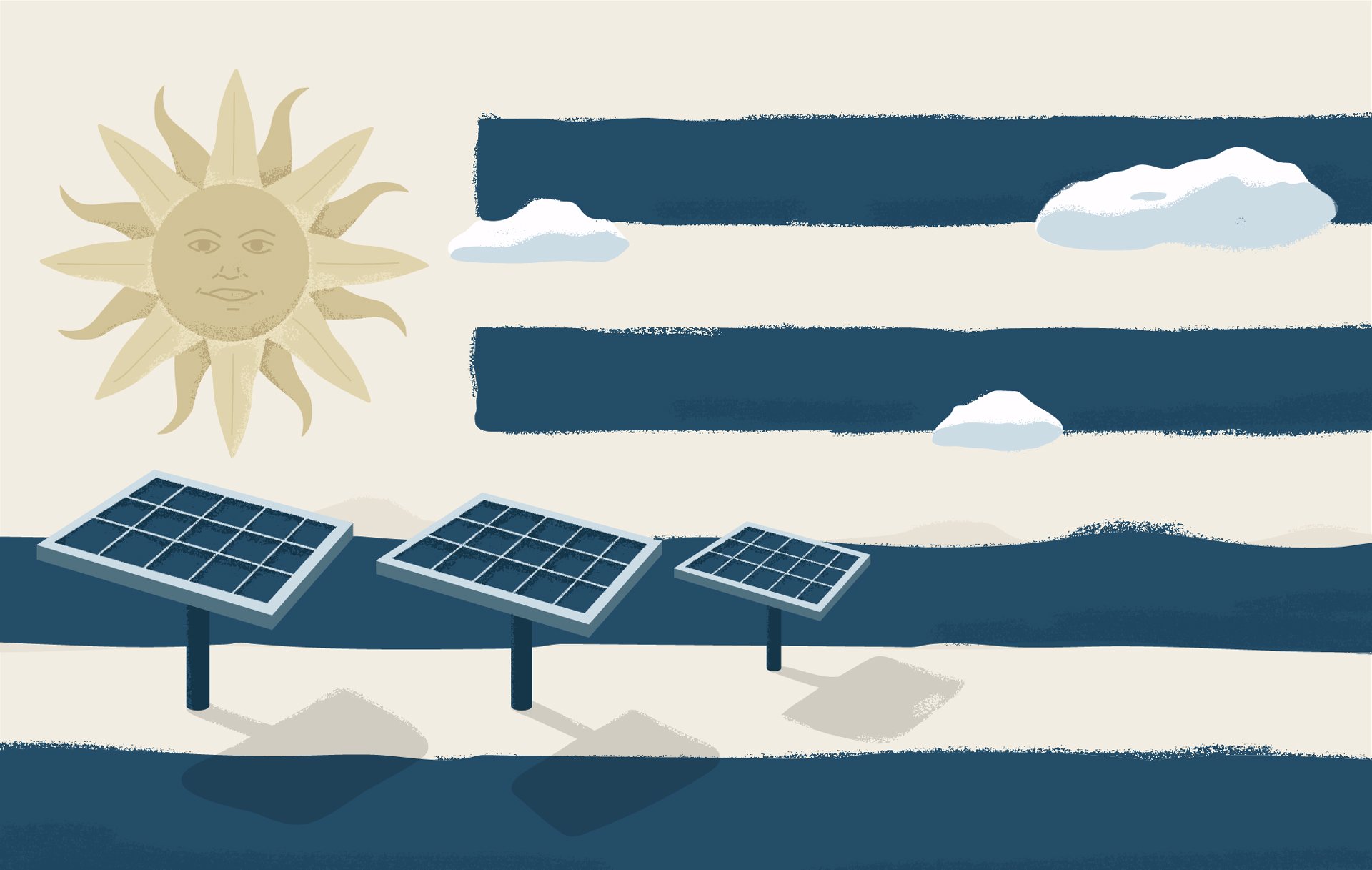- cross-posted to:
- technology@beehaw.org
- cross-posted to:
- technology@beehaw.org
“with wind the single-biggest contributor… Power production costs have declined “by almost half” … And the clean energy sector has created 50,000 new jobs… Ask me what was the impact on the electricity sector in Uruguay after this tragic war in Europe — zero.”
Well done Uruguay.
Meanwhile in South Africa, we’re having blackouts while being almost completely dependant on coal.
I remembered reading many years ago about large solar plants in SA and I wondered what happened to that. Apparently Zuma happened: From a world leader in renewables, to years behind, thanks to Zuma and his cronies.
But I bet the companies make a lot of profit on that, so all good \s
Yep they kick back to the politicians so perfectly to plan
You know you need a lot of sun and wind for renewable energy?
Pretty sure South Africa has too little of it unlike those sunny and wind torn countries like, don’t know… Germany?
Plus coal is more expensive power.
Looks like that’s just the grid? I’m sure there’s more to go for transportation and eliminating the need for generators and gas, but this is a great start!
53,000 barrels/day
It looks like Uruguays oil consumption has flatlined since about 2014. I can’t find any newer data than 2016 but here’s my source:
i think evs are still too expensive for the common uruguaian(?) wallet. so they still use oil for cars. but 4 months 100% renewables is great news.
Presumably mostly for transportation sector. EV adoption should lower that.
Indeed, I have some friends who live in South America and they tell me that electric scooters and three wheelers are becoming very popular. Imported from China.
how those middle east prince now can buy more hookers and supercars if u guys not using oil
Amazing
I wonder how much of that is biomass, and how they’re planning to grow enough vegetation to renew iy
https://app.electricitymaps.com/zone/UY
You can select 30d, year… And see how much was used for that period.
I don’t know how much I trust that website. It states that British Columbia has 100% of its power generation from an unknown source, which it labels as “500 grams per kwhr” equivalent to coal. But we know that 100% of British Columbia’s electricity comes from hydro…
They seem to be using publicly available data.
You can see here the source for the Uruguay https://apps.ute.com.uy/SgePublico/ConsPotenciaGeneracionArbolXFuente.aspx
The website’s number of 500g / kilowatt hour is completely wrong.
This is what BC hydro says:
An efficient, low cost electricity system for B.C. More than 90% of BC Hydro’s generation is produced by hydroelectric generation, which is generally the most cost-effective, clean and reliable option. We also continue to investigate alternative sources of energy, such as wind and wave power.
We generate over 43,000 gigawatt hours of electricity annually to supply more than 1.9 million residential, commercial and industrial customers.
Over 80% of BC Hydro’s installed generating capacity is at hydroelectric installations in the Peace and Columbia river basins.
About 87% of electricity in B.C. is produced from hydroelectric sources. B.C. is home to roughly 16 000 MW of hydroelectric capacity, most of which is located on the Columbia River in southeastern B.C. and the Peace River in the northeast. Site C, a new 1 100 MW hydroelectric facility, is currently under construction on the Peace River. The project is expected to be completed in 2025.
The greenhouse gas intensity of B.C.’s electricity grid Footnote 2 measured as the GHGs emitted in the generation of the province’s electric power, was 7.6 grams of CO2e per kilowatt-hour (g of CO2e per kWh) electricity generated in 2020. This is a 70% reduction from the province’s 2005 level of 24 g of CO2e per kWh. The national average in 2020 was 110 g of CO2e per kWh (Figure 8).
Not too much biomass fortunately. But even with some googling I can’t seem to find how anyone plans to produce enough biomass to keep this going
53% of power currently being generated by wind, the rest hydro. So there you go. They seem to be doing it, so there’s your answer.
Yes they have multiple forms of energy generation, that does not answer the question as to wether their biofuel is sustainable. Yes it’s carbon neutral (ish) but can they produce the biomass as fast as they consume it?
This aspect is a big aspect of intermittent renewables energy that is often dismissed: you need piloted energy as a backup, the amount of piloted energy depend on how oversized is the intermittent energy installation.
For renewable piloted energy there is two options that I know of: hydro and biomass. Uruguay is using both.
It’s something to keep in mind if we want to reach 100% renewables without nuclear, we need to increase the biomass electricity production.
On another hand we are already using a lot of biomass to produce ethanol and biodiesel. A lot of land is also use for animal feed, so I’m a society with less ICE cars and less meat eated we might have enough land to grow biomass for electricity generation.
Biomass as a source of energy has a lot of the same problems as fossil fuels, no? Why is nuclear not on the table while biomass is?
Nuclear does not have the same function than biomass.
A biomass power station is (relatively) cheap to build but the fuel is expensive. So it make sense to have it as a backup and only use it when necessary.
On the other hand nuclear is expensive to build but the fuel is cheap. So building a nuclear power station as a backup does not make sense, it needs to run all the time.
This is the basic ideas, but in practice nuclear is actually beneficial to renewables. The electricity network operator did several scenarios for the French electrical production in 2050. In their scenarios, having around 13% of nuclear in the mix divided by almost two the amount of solar, wind turbines and batteries needed.
But nuclear is scalable while running, allowing you to ramp up and down as needed to cover for the intermittent nature of renewables without relying on fossil fuels or similar. Isn’t that why adding nuclear into the mix is such an effective strategy?
Exactly, but I’m wondering how Uruguay is planning to go from a “might” to a “definitely” enough biomass production
I have no idea but I’m really interested to find out.
Actually one comment of many here set me on the right track! I’ll reply again when I find out!
Gotta get to the airport now tho, laters!
Nuclear fanbois: GASP! How dare you?!
Well, not every country has wind farms or water turbines as viable option. You know, geography and stuff…
So which country has neither wind, water nor sunshine then?
For example Czech republic, Slovakia, baltic states, maybe Finland. It’s not like there’s none of these available. It’s they’re not really viable/meaningful options, yet. Sure you can build solar, but with nearly no sunlight in winter it’s almost useless for half the year…
I don’t understand the nuclear energy hate. Of the nonrenewables it is the cleanest, and it is not always possible to run 100% renewable, (they depend on natural factors such as sun or wind), while nuclear is constant and always producing. Look at Germany and how it is polluting using gas and fossiles, it would be a million times better it they used nuclear energy.
It’s a good energy source in principle and Germany definitely should have let their reactors run longer, but it’s just too damn expensive to build new ones. I’m not aware of any serious private installations of nuclear that are being built right now. One small modular reactor company in the US recently announced they will need twice as much money as previous estimated to build one.
Meanwhile, a ton of people and companies are building solar and wind everywhere.
Because it’s an obvious psyop that took over almost every social media platform. No one was talking about nuclear then BOOM everyone was talking about nuclear all of a sudden with exactly zero mainstream public input from politicians or even marketing from nuclear power companies. People hate nuclear, because some of us have been alive long enough to remember Three Mile Island, Chernobyl, and Fukushima (the worst nuclear disaster in human history, 2011).
Here’s a list of every single nuclear meltdown/disaster/catastrophe https://en.wikipedia.org/wiki/Nuclear_and_radiation_accidents_and_incidents
The fission reaction to boil the water to spin the turbines is clean, but literally every single other facet of nuclear production, from mining, to enriching, to transport, to post-reaction storage (where nuclear waste inevitably always leaks) is disastrous for the environment.
Even worse, they prematurely closed their nuclear power plants, even recently. 🤦♂️
You seem to be the type of person that doesn’t understand that you just can’t easily decide from one day to another to keep nuclear power plants online, that where decided to go offline soon over 10 years ago. Supply chains already adapted, technically necessary inspections weren’t performed because it would soon shut down etc. You just cant easily revert a plan to turn off all nuclear power plans by a certain date from 10 years ago just days or weeks before that date.
Did I ever say that, though? Global warming didn’t happen yesterday, it’s well known for decades. The decision to close npps in first place wasn’t very clever, not revoking the decision later was even worse (I don’t know what was the last possible date to revoke it, I admit - but it’s not easy is a bad excuse). This brilliant plan is resulting in huge pollution while having plenty of renewable sources and spending a ton of money on those.
Edit: grammarYeah in a perfect world, Germany would have kept their npp and phased out coal first instead but it’s not a perfect world sadly and considering the npp operators were heavily campaigning against renewables Germany probably wouldn’t have invested that much in renewables if npp weren’t phased out. The only problem now is that Germany didn’t keep their momentum for investing in and expending renewables
Decades and decades of fossil fuel company FUD about nuclear that they managed to get the greens to buy into a long time ago.
No, not FUD. it’s the radioactive waste issue. And enormous expense.
And a security issue. Think of the mess if war/terrorism comes home and adversaries starts blowing them up.
I actually never thought of it like that, if you’re not partaking in the trade of fossil fuels, you are removing yourself from a lot of potential conflicts and “who support who” ordeals.
Was the wind blowing all night every night? Or do they have enough hydro (or another power source) to power then while the sun is down?
Ever heard of batteries?
Ever heard of insane amount of batteries required for that?
No, what are they?
Very cool. I hope they are looking at reducing demand for power as much as increasing production.










